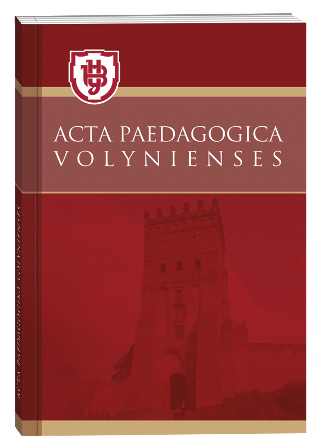RESEARCH ON THE FORMATION OF THE PERSONALITY OF A PRESCHOOL CHILD IN HISTORICAL RETROSPECT
DOI:
https://doi.org/10.32782/apv/2024.1.2Keywords:
personality, personality of a preschool child, personality development, personality structure.Abstract
The study presents a systematic historical-pedagogical view of the problem of the formation of the concept of «personality» from the standpoint of its determinism. A well-founded scientific assessment of the historical genesis of the formation of a personality in general and of a child in preschool childhood in particular. The authors present such a vision of personality, the formation of which is a chain of a person’s transition from biological (individual) to social and to individual (spiritual) stages of development. At the same time, the internal, selfdetermined criterion and driving force of personality formation in preschool years is development, which is based on subject-transformative activity and requires pedagogical management. On the basis of polyscientific approaches to the study of personality, the authors interpret it as a subject - a participant in the evolutionary-historical process, acting as a bearer of social roles and having the opportunity to choose a life path, during which he transforms nature, society and himself. In the absence of a universal personality model, the importance of understanding the functional characteristics of this concept, such as attributes, traits, qualities, taking into account their empirical stability, is emphasized. At the basis of the formation of two images - a conforming personality and a creative personality - the authors consider the phenomenon of conflict resolution «personality («like everyone else») - individuality («like no one»)». Researchers see a way to resolve this conflict in the use of creative tasks in educational activities that will stimulate the formation of personality based on divergent thinking. The article proves that the deepest meaning of the life activity of an individual, aimed at the reproduction of human culture in all its diversity and uniqueness, is creativity - an immanent personal essence, the driving force of life’s progress and the absolute manifestation of the individual’s freedom in the right to god-like activity, i.e. to creation.
References
Енциклопедія освіти / Акад. пед. наук України ; гол. ред. В. Г. Кремень. К. : Юрінком Інтер. 2008. 1040 с.
Skinner B. F. The shaping of a behaviorist: part two of an autobiography. N. Y.: Knopf. 1979. 373 p.
Bandura A. Social cognitive theory of social referencing. In S. Feinman (Ed.), Social referencing and the social construction of reality in infancy (pp. 175-208). N. Y. : Plenum. 1992. 284 p.
Maslow A. Motivation and Personality. N. Y. : Harper & Row, 1970. 493 p.
Сисоєва С. О. Основи педагогічної творчості : підручник. К. : Міленіум. 2006. 346 с.
Чепа М.-Л. А. Шлях від народження до смерті : осмислення сутнісних рівнів людського розвитку // Проблеми загальної та педагогічної психології. – зб. наук. праць Ін-ту психології ім. Г. С. Костюка НАПН України. К. 2001. Т. ІІ. Ч. 2. С. 31–40.
Oleksandr Semenov, Nataliia Semenova, Hanna Bielienka, Nadiia Alendar, Oleksandra Yemchyk, Iryna Onyschuk Empirical Research of a Creatively Oriented Personality’s Formation of a Child of Senior Preschool Age / Revista Românească pentru Educaţie Multidimensională, 2021, Volume 13, Issue 4, Р: 413-434.







